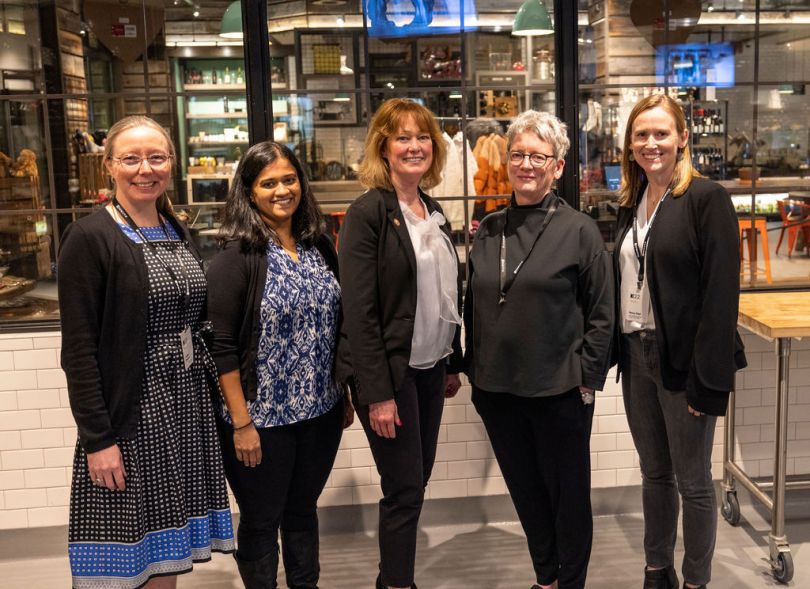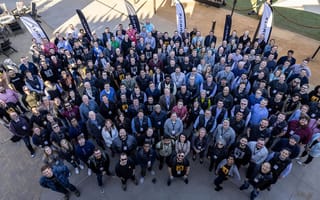Birds have distinct personalities. Eagles communicate directly and strive to conquer new opportunities. Parrots can be spotted motivating others, bustling with energy and enthusiasm. Doves are steady and calm in their movements, and prefer an evenly-paced environment. Owls are inquisitive: With a keen eye for details and systematic procedures, they are driven by quality and consideration.
You might never see these birds interacting in the wild, but at Immuta, it’s an everyday reality. Not because of a rooftop aviary or cages scattered throughout the office, but because every employee is invited to participate in the DiSC assessment from day one of joining the company — and to determine their “bird” type. The DiSC model provides four language categories that people identify with to better understand themselves and communicate with co-workers.
DiSC stands for four personality profiles: (D)ominance, (i)nfluence, (S)teadiness and (C)onscientiousness.
“I have been through many different assessment tests over the course of my career, but none of them have been quite like DiSC,” Chief Operating Officer Mary Byrne said. “You’re identified by one of the four birds — eagle, parrot, owl and dove — and I realized that the way I communicate was in a very distinct style.”
“When used properly, it breaks down all communication barriers,” added Leigh Hefferon, director of employee enablement. “Because at the end of the day, we’re just trying to get our thoughts across to each other clearly. On our org chart, everyone’s little bird type is right there.”
Focusing on clear communication, and in such a fun way, helps Immuta stay true to their startup culture, while also zeroing in on workplace collaboration and success.
What does Immuta do?
Fostering an environment of seamless communication is essential for leaders like Byrne to not only work efficiently as a team, but to better understand each other’s needs and provide impactful systems of support. That’s because leadership doesn’t just want to help employees develop their careers at Immuta — they want to help them develop as human beings.
“I think we truly stand out from other startup companies in the way we take care of our people,” Byrne said. “Recently, we had an employee whose apartment building had flooded — they lost power and it was a real emergency. So leadership found an Airbnb and we put them up for six weeks, covering all the costs.”
Over the course of the pandemic, any employee who tested positive for Covid-19 could expect similar acts of kindness — receiving DoorDash gift cards, soup orders or cookies at their doorstep. After recently growing to more than 250 employees since launching in 2014, Immuta is looking to hold onto that very same tight-knit, personalized approach as the company scales into the future.
An essential ingredient for achieving the desired outcome? Staying connected to better understand one another.
“It’s not all about money: It’s about the care and checking in to make sure that people are okay,” Byrne said.
However, care extends beyond random acts of kindness and encouraging Slack messages between co-workers — it’s ingrained into Immuta’s culture. It can be found in the volunteer beach days spent cleaning up the South Boston community on Earth Day, in the $1,250 annual learning stipend granted to employees, and now even in the latest individual development plan (IDP) initiative rolled out for employees.
“We wanted development to be something our people work on daily and weekly with their manager while always receiving support programmatically,” Hefferon said. “We started everyone with a self reflection prompt of 10 questions just to get people thinking about where they want to go next at Immuta and put the ownership of their career growth in their own hands.”
With every employee embarking on a personalized IDP, leaders like Byrne and Hefferon are hoping to not only grant future career opportunities to the teams they lead, but place the reins of choice back into curious hands. Self-discovery is encouraged at Immuta through a variety of channels, like the company’s catalog of 7,000+ Udemy courses or lunch-and-learn sessions aptly dubbed “meet and eats.”
To leaders at Immuta, their efforts are paying off. Even with teams working remotely throughout the U.S., Canada, Europe and Australia, employees still manage to stay connected by discussing local rugby teams, flying in for barbecues or ice cream socials, and even partying with the local penguins at the aquarium during company-wide holiday outings — because relishing in the moment all together holds irreplaceable value.
“I was actually joking with someone today about our holiday party because we were told the penguins had to go to sleep,” Hefferon said, chuckling. “So the aquarium lights go down because they’re literally going to bed and we’re like, ‘Yeah, we can be quieter. But we’re staying!’”

What is the company culture like at Immuta?
COO Mary Byrne: One of core values is “humble intellect.” What we like to believe is that we hire extremely smart people and then we ask them to check their egos at the door. What that enables is an environment where people feel safe and they feel as though they can throw crazy ideas up on the board without feeling uncomfortable. It allows for a lot of innovation and creativity that I think other companies don’t have, and it’s a very special environment to work in.
Director of Employee Enablement Leigh Hefferon: Right off the bat, there’s no false pretense. You’re embedded in the culture and you’re one of the team members, so I don’t ever feel like I’m missing out on inside jokes between co-workers. It’s this environment of continual learning and “fail fast, fail often” because we stay inspired, curious and engaged. We bring our authentic selves to work and create that space of psychological safety.
Director of People Programs Steph Sheline: We have a distributed global team working in numerous time zones around the world. This creates a unique set of challenges, but we overcome many of those by frequently bringing folks together in person to establish that sense of community. One of the more exciting events we pulled off was an online auction in support of Women’s History Month where employees donated items to be auctioned, everyone bid on the items and all proceeds raised were donated to a women’s organization. It was a blast to see the creative hidden talents among our team and simultaneously support a worthy cause.
“It’s not every day that you’re given time to sit down and say, ‘Well, what about me? Where am I? What am I doing?’ And to have an employer do that for you, people are relieved to have that formal framework.”
Why is rolling out a mandatory IDP so important for employees at Immuta?
Hefferon: It really became about making people aware that on-the-job experience is 70 percent of professional development, and changing the mindset around taking a course or joining part of a program was a big piece of that. It’s a different mindset than before the pandemic that gave us the opportunity to say, “I spend a lot of time at work, so I hope I like what I’m doing.”
To create accountability for the IDP, we’ve put the onus on the employee: They’re in the driver’s seat and they need to take responsibility for the future they want. Development enhances an employee’s engagement and ability to be successful, so there’s the security of seeing a return on investing in the employees, because engaged and happy employees are more productive. Plus, the fact that managers are involved in supporting those team members, acting as mentors and helping them blossom has been really fun to watch.
Byrne: Some people eventually want to get a PhD, and others want to learn how to be better at public speaking, or learn more about the cultural norms of the customers they interact with to showcase respect. You get to learn a lot about your employees when you sit down and have some of these conversations with these IDPs.

How does something like the DiSC assessment help create better collaboration between teams?
Byrne: I’m an eagle, and most of my team are doves. I found out my way of communicating was sometimes not being completely understood because I had a tendency to talk in soundbites, and they wanted to have a bit of conversation to soften the edges. So I started adapting my communication style, and I think that it has really helped. Take the owls, as an example. They are people who are really into detail, and I’m not, and I realize I need an owl or two on my team in some key roles because otherwise I will fail.
Hefferon: When I’m talking, talking, talking — loudly and rapidly and in various directions — I’m not saying anything that necessarily matters to others. I’m just getting my ideas out of my head because that’s my process. What I learned from this deeper dive into DiSC and Immuta is that I have to stop doing that because it makes people uncomfortable. It’s great because I can tailor my behavior, but I can also go into a conversation with an owl and let them know that I’m a triple parrot, so when I’m starting to go on a tangent they can let me know. I’m totally cool with it! I just need to know.
“The more employees bring their ideas and their perspectives to the table, the better equipped we are to keep doing exactly what we’re doing: succeeding.”
What originally drew you to a career at Immuta? What do you hope job seekers take away from day one of the interview process?
Sheline: Before I joined Immuta, I had spent more than a decade working in higher education. I knew I wanted to pivot into a space that was fast-moving, and Immuta seemed like the right option to achieve that goal. From my first interview to now, I’ve yet to interact with a team member who isn’t passionate about their work and willing to go above and beyond to help others. That’s a quality you don’t find at all organizations, and one of the reasons I knew Immuta was the right fit for me.
Hefferon: I was fortunate to have an opportunity to pivot in my career and Immuta was a gracious host with a humble and wonderful team. During my first interview we talked for an hour, and every subsequent interview I felt more connected to the people — it just felt right. We’re solving real world problems for real people and we’re doing it in a way that is accessible. That goes back to our humble intellect: We’re all partners in this and we’re all working together. From the moment I had that first conversation, I thought “If I don’t get this job, I’m going to be heartbroken.” And here we are.








